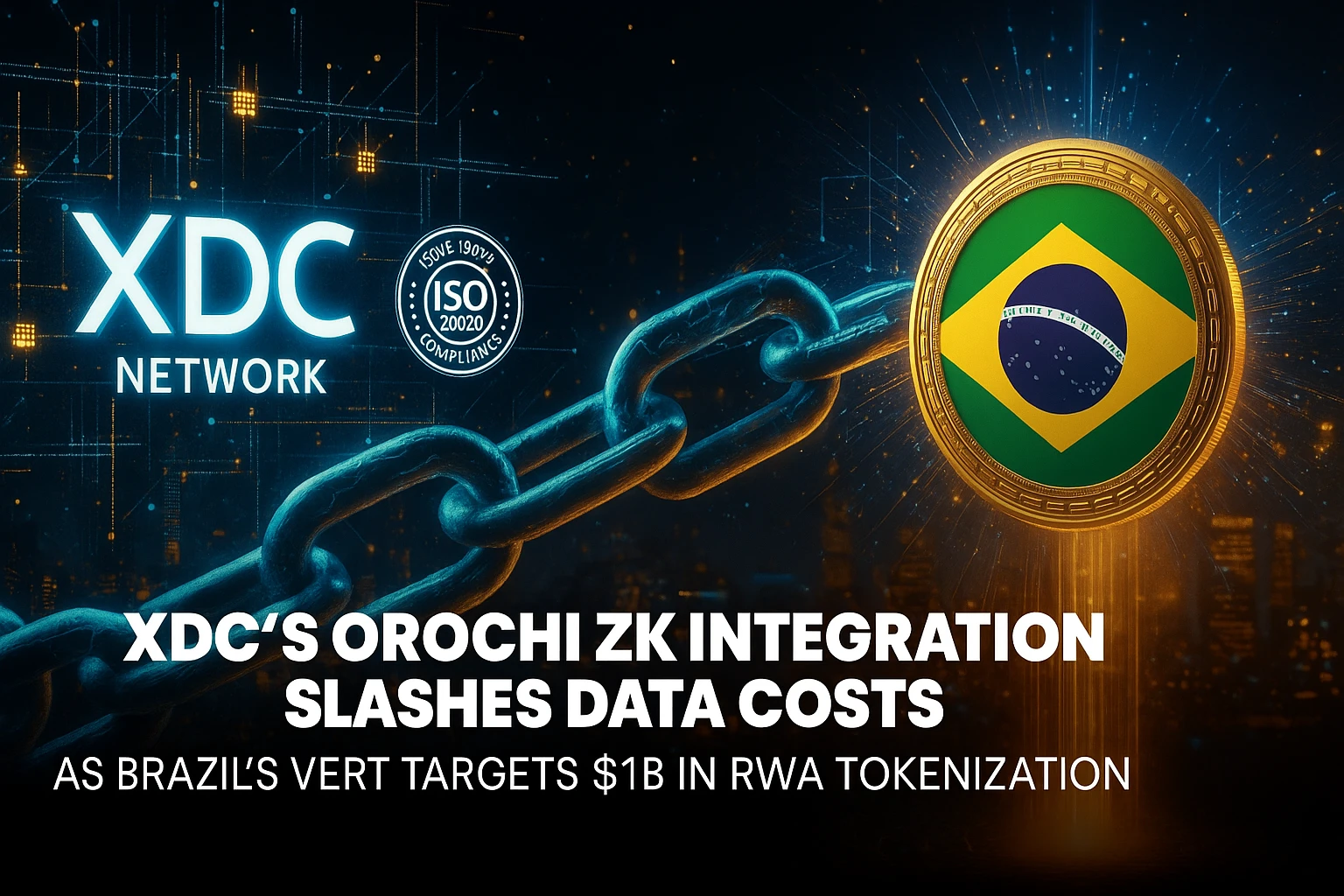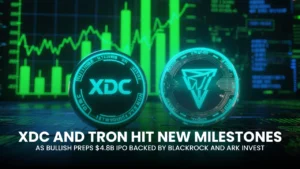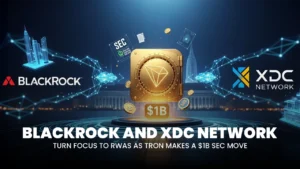XDC’s Orochi ZK Integration Slashes Data Costs As Brazil’s VERT Targets $1B In RWA Tokenization

The XDC Network has partnered with Orochi Network to bring zero-knowledge verifiable data to tokenized real-world assets. At the heart of the collaboration is Orochi’s zkDatabase, a system designed to turn raw information into cryptographically verifiable, tamper-resistant proof that institutions can check without exposing sensitive data.
- The Announcement And Why It Matters
- How Verifiable Data With ZK Alters RWA Economics?
- Evidence Of A Tokenization Push On XDC
- Technical Fit: DPoS In Production, Built For Throughput
- What The Partnership Could Unlock For Institutions
- Market Context: RWA Funding Flows And A Rising Baseline
- Data Check: Key Numbers Now
- On The Record
- Risks And Unknowns
- Outlook
- Conclusion
- Frequently Asked Questions About XDC Network Orochi Partnership
- What exactly did XDC and Orochi announce?
- Why does zero knowledge verifiable data matter for RWAs?
- How much cheaper could data integrity become?
- Is XDC actually used for tokenization today?
- How does Delegated Proof of Stake help here?
- Is the RWA market truly growing?
- Will this work across other chains?
- What are the main risks?
- Does this change XDC token economics?
- Glossary of Key Terms
Running on XDC’s Delegated Proof of Stake consensus, these proofs can be committed and verified with predictable finality and low fees, which suits compliance-focused issuers. The move aims to harden the audit trail behind tokenized bonds, receivables, and other instruments that are starting to move on-chain.
By pairing zero-knowledge verification with a DPoS network and delegated staking that aligns validators and token holders, the stack strengthens trust, increases throughput, and keeps settlement efficient for real-world asset tokenization.
ALSO READ: Sui Buyback Signals Balance Sheet Conviction as Tron’s Block Size Scales a 2-Year Peak
The Announcement And Why It Matters
Crypto.news reported on September 15 that XDC integrated Orochi’s zkDatabase to strengthen verifiability, scalability, and compliance for tokenized RWAs across its ecosystem. The article cites a sharp cost differential that can decide whether an RWA pilot remains a pilot or scales.
According to the report, the integration reduces data integrity costs from roughly 25 dollars per kilobyte on Ethereum to about 0.002 dollars per kilobyte, bringing on chain data proofs into a price band that corporate issuers can stomach.
Orochi’s public materials echo those economics. The team frames zkDatabase as a verifiable data layer that couples Proof Carrying Data with modern zero knowledge systems and lists the same 25 dollars down to 0.002 dollars per kilobyte range, positioning the stack for RWA, AI, DePIN, and Web3 use cases. That pricing matters because verifiable audit trails are only as useful as an issuer’s ability to afford them at scale.
How Verifiable Data With ZK Alters RWA Economics?
Tokenization lives or dies on reliable, machine checkable data. On paper, RWAs promise new liquidity and faster settlement. In practice, institutions need to prove that asset data is correct and that any transformation on that data can be verified later.
Orochi’s approach packages correctness into proofs that a contract or auditor can validate without revealing the underlying dataset. If the cost to persist and verify those attestations falls by two orders of magnitude or more, issuers can preserve privacy and still provide a full audit trail. That is the kind of trade off procurement teams and risk officers are paid to find.
ALSO READ: Ark Invest Diversifies Exposure: Sells Tempus AI; Buys Amazon, Figma, and Bullish Shares
Evidence Of A Tokenization Push On XDC
The XDC Network has positioned itself as RWA friendly infrastructure. In July, CoinDesk reported that Brazilian securitization firm VERT Capital plans to tokenize up to 1 billion dollars in debt and receivables on XDC over the next 30 months, a pipeline that spans corporate bonds, agribusiness receivables, and structured credit. The deal highlights Brazil’s emergence as a regional tokenization hub.
That push builds on earlier XDC activity. The XDC Foundation recapped that Mercado Bitcoin, a major Brazilian platform, issued an initial 12 million dollars in fixed income RWA tokens backed by regulated corporate debt on XDC.
This signals that XDC has already hosted real issuances rather than simple proofs of concept.
The broader RWA market is also gaining mass. Crypto.news, citing RWA.xyz, reported on September 12 that tokenized RWAs on public chains reached a record 29.17 billion dollars, led by private credit above 16.7 billion dollars and on chain U.S. Treasuries around 7.4 billion dollars. For context, including stablecoins pushes on chain tokenized value above 308 billion dollars.
Technical Fit: DPoS In Production, Built For Throughput
For RWA issuers, the consensus engine matters when settlement speed, uptime, and cost all show up in service level agreements. XDC runs a Delegated Proof of Stake model, known as XDPoS. Official documentation and recent governance materials describe two second block times with finality in roughly six seconds after the XDC 2.0 upgrade. The network uses a global set of KYC confirmed validator masternodes and a BFT style protocol for quick, deterministic finality. In plain terms, DPoS gives XDC the headroom to clear high volumes of small, verifiable data writes without congesting the chain.
ALSO READ: TRON Shifts to Enterprise iOS Rail as ARK Invest Prunes ETFs and Repositions Holdings
XDC’s migration to XDC 2.0 in late 2024 tightened security and forensics and laid groundwork for subnets. For tokenization, that architecture matters because financial products often require permissioned environments that still anchor to a public settlement layer. DPoS helps balance those demands by pairing high throughput with predictable finality windows.
What The Partnership Could Unlock For Institutions
If you strip out the buzzwords, institutions want three things from RWA rails. First, clean audit trails with verifiable steps from origination to redemption. Second, predictable, low costs so products can be priced competitively. Third, interoperability, so proofs and assets can move across chains and systems when custody providers or venues change.
The XDC and Orochi pairing maps to those needs. zkDatabase packages correctness into portable proofs that smart contracts and auditors can check. XDC’s Delegated Proof of Stake keeps the meter running cheaply with fast finality so proofs and state commitments land quickly. Interoperability comes from Orochi’s proof-agnostic model and from XDC’s EVM compatibility, which lowers integration friction with existing tools. If VERT Capital’s 1 billion dollar plan ramps on schedule, expect more corporate treasurers and securitization desks to test similar stacks.
Market Context: RWA Funding Flows And A Rising Baseline
The headline numbers tell a story. RWAs on chain crossing 29 billion dollars shows that a floor is forming. Private credit dominates today, followed by tokenized Treasuries, while equities are starting to appear. The Orochi integration should be read against that backdrop. Cheaper, verifiable data is not an abstract win. It reduces the per product cost to meet compliance and audit standards, which is where many tokenization pilots slow down. As cost and verification converge, product teams can ship faster without creating governance debt.
ALSO READ: Cardano Boss Puts $200M Into Healthcare Amid Top Show By TRON and XDC Network
Data Check: Key Numbers Now
| Metric | Value | Date |
| RWA value on chain | 29.17 billion dollars | Sep 12, 2025 |
| Private credit on chain | 16.7 billion dollars | Sep 12, 2025 |
| U.S. Treasuries on chain | 7.4 billion dollars | Sep 12, 2025 |
| Data integrity cost on Ethereum | about 25 dollars per KB | Sep 15, 2025 and Apr 10, 2025 |
| Data integrity cost via zkDatabase | about 0.002 dollars per KB | Sep 15, 2025 and Apr 10, 2025 |
| VERT Capital planned tokenization | up to 1 billion dollars over 30 months | Jul 30, 2025 |
| Mercado Bitcoin initial issuance | 12 million dollars fixed income on XDC | Jun 4, 2025 |
| XDC consensus targets | about 2 second blocks, about 6 second finality | Sep 1, 2025 |
On The Record
Here are two primary sources announcing and amplifying the news.
Orochi Network tweet announcing the partnership
🐲 Orochi x @XDC_Network_
We’re thrilled to announce a new partnership between Orochi Network and XDC Network. Together, we’re unlocking the future of Real-World Assets with zk-powered Data Verification and XDC’s enterprise-ready blockchain infrastructure.
🔗… pic.twitter.com/xRRCi37ZD4— Orochi Network (@OrochiNetwork) September 15, 2025
Risks And Unknowns
Every integration faces real world friction. Corporate data governance is complex, and cross chain portability can introduce new failure modes if not standardized. While the XDC 2.0 upgrade enhanced security and forensics, operational risk still needs careful runbooks and monitoring.
Cost curves can also change as network demand shifts. Finally, regulation is live and evolving, which is why partnerships in Brazil and elsewhere matter, because they pressure test these systems under local rules. None of these caveats undercut the core thesis. They simply define the work ahead.
Outlook
The XDC and Orochi tie up gives RWA teams a clearer path to verifiable, privacy preserving tokenization. It links a fast, enterprise oriented DPoS chain with a proof system built to make data portable and auditable across stacks.
If the 1 billion dollar VERT pipeline hits milestones and more issuers follow Mercado Bitcoin’s footsteps, expect verifiable data to move from feature to requirement across tokenized credit, receivables, and eventually more complex structures. The economics are moving in the right direction, and the tooling is maturing.
Conclusion
The partnership is straightforward. XDC brings Delegated Proof of Stake throughput and finality. Orochi brings zero knowledge verifiable data with cost discipline. Together, they target the messy middle of tokenization, where auditability and compliance make or break products.
Recent numbers show that RWAs are gaining ground. If verifiable data stays cheap and portable, more issuers will cross the line from pilots to production.
Frequently Asked Questions About XDC Network Orochi Partnership
What exactly did XDC and Orochi announce?
They announced the integration of Orochi’s zkDatabase on the XDC Network to provide cryptographically verifiable data for tokenized real world assets.
Why does zero knowledge verifiable data matter for RWAs?
It allows issuers to prove data correctness to smart contracts and auditors without exposing sensitive information, strengthening compliance and trust.
How much cheaper could data integrity become?
The reported range falls from about 25 dollars per kilobyte to about 0.002 dollars per kilobyte, which changes the economics of scaling proofs.
Is XDC actually used for tokenization today?
Yes. VERT Capital plans to tokenize up to 1 billion dollars on XDC and Mercado Bitcoin has issued fixed income tokens backed by Brazilian corporate debt on the network.
How does Delegated Proof of Stake help here?
DPoS on XDC targets about two second blocks and about six second finality, which lowers latency and provides predictable settlement for data proofs.
Is the RWA market truly growing?
RWA value on chain reached a record 29.17 billion dollars in September, led by private credit and Treasuries.
Will this work across other chains?
Orochi’s proof agnostic design aims for interoperability across multiple ecosystems, which helps when assets or venues require cross chain movement.
What are the main risks?
Operational complexity, evolving regulation, and the need for standardized proofs across systems remain the big hurdles. The XDC 2.0 upgrade strengthened the base layer, but implementation still matters.
Does this change XDC token economics?
The announcement focuses on infrastructure and compliance, not token incentives. Any market reaction is outside the scope of the facts reported here.
Glossary of Key Terms
- Delegated Proof of Stake
A consensus model where token holders delegate stake to validators that produce blocks. - DPoS
Short form for Delegated Proof of Stake used across this article. - Zero Knowledge Proof
A cryptographic method to verify correctness without revealing underlying data. - Proof Carrying Data
A framework where data ships with proofs of correctness for independent verification. - RWA
Real world assets that are tokenized on public blockchains for settlement and transfer. - Finality
The point at which a transaction is irreversible on chain. XDC targets about six seconds. - EVM Compatibility
Support for Ethereum style tools and smart contracts to ease integration. - Masternode
A validator that participates in consensus and block production on XDC’s DPoS network. - Data Availability
The guarantee that data required to validate a chain is accessible, often a cost driver. - Audit Trail
A verifiable record of events used by regulators and auditors to confirm compliance.




